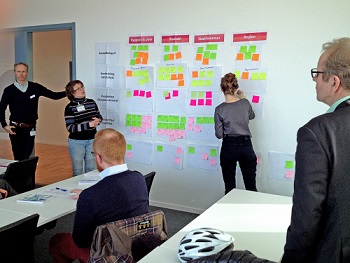Integration of dissemination into SEAPs and creation of iconic innovative projects’ was an opportunity for the four partner cities to look at innovative approaches to communicating with stakeholders and citizens, and offer recommendations to cities that may be in the process of developing and implementing a SEAP. This approach is particularly important to ensure that dissemination forms a key part of the SEAP from the outset.
The projects
Each city focused on the dissemination of one or two innovative projects, developed through Work Package 3, as well as their enhanced SEAPs, as follows:
| Ghent - Sint-Amandsberg Dampoort
- Ghent’s Climate Plan
Glasgow - District Heating and ESCo
- Demand Side Management
- Glasgow’s Energy and Carbon Masterplan
Gothenburg - Smart Urban LogisticsPlanning for Sustainable Lifestyles
- Climate Programme for Gothenburg
Riga - Database for multi-apartment residential buildings
- Remote reading and transmission of smart meter data in power supply
- Riga Smart City SEAP
| 
|
For each project the cities considered key messages being disseminated; key dissemination actions being undertaken; key stakeholders targeted; channel/tools for dissemination; scale of dissemination; how the effectiveness of dissemination will be evaluated; and opportunities to link to planned events. Cities also provided information on the dissemination of their enhanced SEAPs, detailing: SEAP communication activities and channels, how different stakeholders are engaged, how SEAP dissemination success will be evaluated, and any reflections and lessons learned.
Key Findings
Whilst the four cities each have their own priorities and drivers for communication activities, there are some key common findings that each city has shared in this deliverable, as follows:
- Disseminating information about the iconic projects is a good way to demonstrate actions from the enhanced SEAPs;
- There is a need to tailor the types of message communicated, and the types of communication activity, to different groups of stakeholders;
- Each city has identified similar methods of dissemination, for example: Facebook, direct e-mails, meetings, workshops and conferences, websites, social media, television, third party organisations, surveys, and newsletters;
- Linking to high profile events also presents a good opportunity for reaching out to local external stakeholders;
- Monitoring the success of dissemination is important, through methods such as monitoring attendance at meetings, the uptake of new ideas and initiatives, ongoing collaboration and cooperation, and website traffic.
Recommendations
A number of key recommendations have come out of this deliverable from the cities’ experiences, which may be useful for other cities developing their own dissemination plans for SEAPs, other energy strategies and related projects:
- Start communicating with stakeholders early on in the SEAP dissemination process;
- Tailor your messages to different stakeholders’ priorities and interests;
- Explore the range of communications tools available;
- Prepare easy to understand brochures, videos or other materials to disseminate the key messages;
- Find out about planned events and initiatives, and consider linking dissemination activities to these;
- Research which stakeholders would be key for ensuring the SEAP and innovative projects are well-supported and effectively implemented;
- Re-visit and revise your communications plans and materials on a regular basis;
- Understand what communications skills and staff time are available in-house, and identify resources necessary for dissemination.
For more information about this deliverable and the lessons learned, you can review the Executive Summary here.